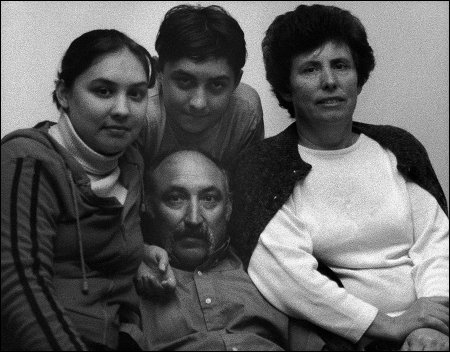Joe and Lucy

Photograph, John Owens.
Lucy: Portugal was a very poor country in the 1970s and my husband and I decided to come to Australia because we wanted to find a better life.
Joe: I worked in the army for three years in Portugal and had already spent a lot of time away from home. When I left the army we came to Australia where my brother and sister were living.
Lucy: After arriving in Australia in 1974, we were disappointed because English was very hard to learn. It took me about six years to feel happy here. I always dreamed of going back to Portugal but when I went back to visit, years later, I saw so many differences between the two countries and I realised we lived a better life in Australia.
After we settled down and bought a house we never really worried about the language barrier. Even now there are things in the news or on television that we don’t understand but we don’t really worry about it. We are still learning.
Joe: In Portugal I worked as a builder but when I came to Australia I changed jobs and worked in factories and spray-painting cars. About one year after we arrived, I got a job working in a flower nursery in Dingley. I was working 60-hour weeks; at the nursery during the day and at the Bosch factory at night. After 25 years I still work at the nursery.
Lucy: The nursery was so beautiful with big paddocks full of flowers and carnations. All the flowers made me so happy. Today they don’t grow many flowers. They buy them from somebody else and the paddocks are full of weeds.
Joe: We moved to Clayton South in 1983. At that time the area around Westall Secondary College, where we live, was built up but behind us was empty land: tips, bush, big trees and rabbits running everywhere. We liked it because it was cheap, quiet and close to school, public transport and work. We thought it would be good for our kids.
Lucy: We speak Portuguese together but with the children we mix Portuguese and English. I don’t know why because I prefer to speak Portuguese with the children so that they will learn it better. They all go to Portuguese school in Springvale on Saturday mornings.
There are only a few other Portuguese people in Kingston. We had a Portuguese Association but it shut its doors because it didn’t get enough people. We didn’t even have enough people for a soccer team.
Our life here is very different to our life in Portugal. Here we work the same hours as we did in Portugal but for three times the money and my children have a much better education than they would have received in Portugal.
I don’t have a mother or father any more but I am one of ten brothers and sisters and have many aunties, uncles and cousins who I hardly ever see. Even after all this time I still miss my family.
